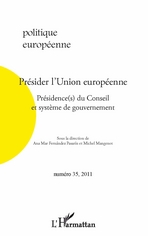The Institutionalization of the European Council Presidency : Institutional Dependence and Franco-German Inflections

Following its pragmatic emergence in the EU political landscape, the Presidency of the European Council was the most visible part of the rotating Presidency until the entry into force of the Lisbon Treaty. An in-depth analysis of this function shows its long dependency on the half-year exercise.
The Institutionalization of the Presidency of the European Council was primarily marked by two periods of inflection during which the behaviours of the actors, especially French and German leaders, have tailored a presidential role dissociated from the rotating presidency. The emergence of this supranational role has led to heightened tensions over questions of identity, due to its exercise by national leaders. Moreover, the secondary nature of its legal formalization as regards reflections and codifications by the actors themselves is clearly underlined by this institutional construction.
Related centers and programs
Discover our other research centers and programsFind out more
Discover all our analysesBundeswehr: From Zeitenwende (historic turning point) to Epochenbruch (epochal shift)
The Zeitenwende (historic turning point) announced by Olaf Scholz on February 27, 2022, is shifting into high gear. Financially supported by the March 2025 reform of Germany’s “debt break” and backed by a broad political and societal consensus to strengthen and modernize the Bundeswehr, Germany's military capabilities are set to rapidly increase over the coming years. Expected to assume a central role in the defense of the European continent in the context of changing transatlantic relations, Berlin’s military-political position on the continent is being radically transformed.
Merz’ European Policy-making: The End of the ‘German Vote’?
Friedrich Merz’s European ambition is to turn Germany, long seen as hesitant into a leading actor within the European Union (EU). To that end, he has pledged to end the “German vote,” a phenomenon that epitomizes the paradox of a country both indispensable and frequently absent from European decision-making.

Securing critical raw material (CRM) value chains – a prerequisite for Europe’s technological resilience
At the heart of economic security, technological resilience is a backbone of the European Union’s (EU) competitiveness. The EU’s energy and digital transitions depend on critical raw materials (CRM).

Reconciling competitiveness and demographic change: a Franco-German imperative
France and Germany are facing parallel demographic shifts that could reshape the future of their economies and their social models. These shifts reflect broader European patterns but are magnified by the central role both nations play in EU governance and competitiveness.









